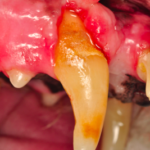Understanding Periodontal Disease in Pets
Periodontal disease is the most common dental condition in both dogs and cats, affecting the tissues surrounding the teeth due to the buildup of bacterial plaque. If left untreated, it can lead to pain, infection, tooth loss, and even systemic health issues affecting the heart, liver, and kidneys.
How Is Periodontal Disease Treated?
The severity of periodontal disease determines the best course of treatment. In mild to moderate cases, we may be able to save affected teeth with specialized periodontal procedures. However, in cases of advanced disease, extraction is often the best option to eliminate infection and pain.
✔️ Advanced Periodontal Treatments to Save Teeth
For pets with compromised teeth, we offer the latest periodontal treatments to restore oral health, including:
Root planing – Deep cleaning below the gumline to remove bacterial buildup.
Perioceutics (local antibiotic gel application) – Helps fight infection and promote healing in the affected area.
Bone grafting – Regenerates lost bone to stabilize affected teeth.
Hemisectioning – A technique for salvaging part of a multi-rooted tooth by removing only the diseased section.
Gingival flap surgery – Lifts and repositions gum tissue to allow thorough cleaning and healing.
Gingival grafts – Used to restore gum tissue lost due to disease or trauma.
✔️ When Is Extraction Necessary?
If a tooth is severely affected by periodontal disease and cannot be saved, surgical extraction is the best treatment to eliminate infection, relieve pain, and prevent further complications.
Long-Term Care for Periodontal Health
For periodontal treatments to be successful, daily at-home care is essential. We recommend:
✔️ Brushing your pet’s teeth daily – Start a few weeks after the procedure and continue for life.
✔️ Regular professional dental cleanings – Helps maintain gum health and prevent future disease.
✔️ Dental-friendly diets and chews – Designed to reduce plaque buildup between cleanings.
At Pet Dental Center, we are committed to helping pets maintain a healthy, pain-free mouth. If you suspect your pet has bad breath, red or bleeding gums, difficulty eating, or loose teeth, schedule an evaluation with our expert team today!

Severe Periodontal Disease of an upper right canine tooth in a dog

Repair of that canine in order to avoid extraction

